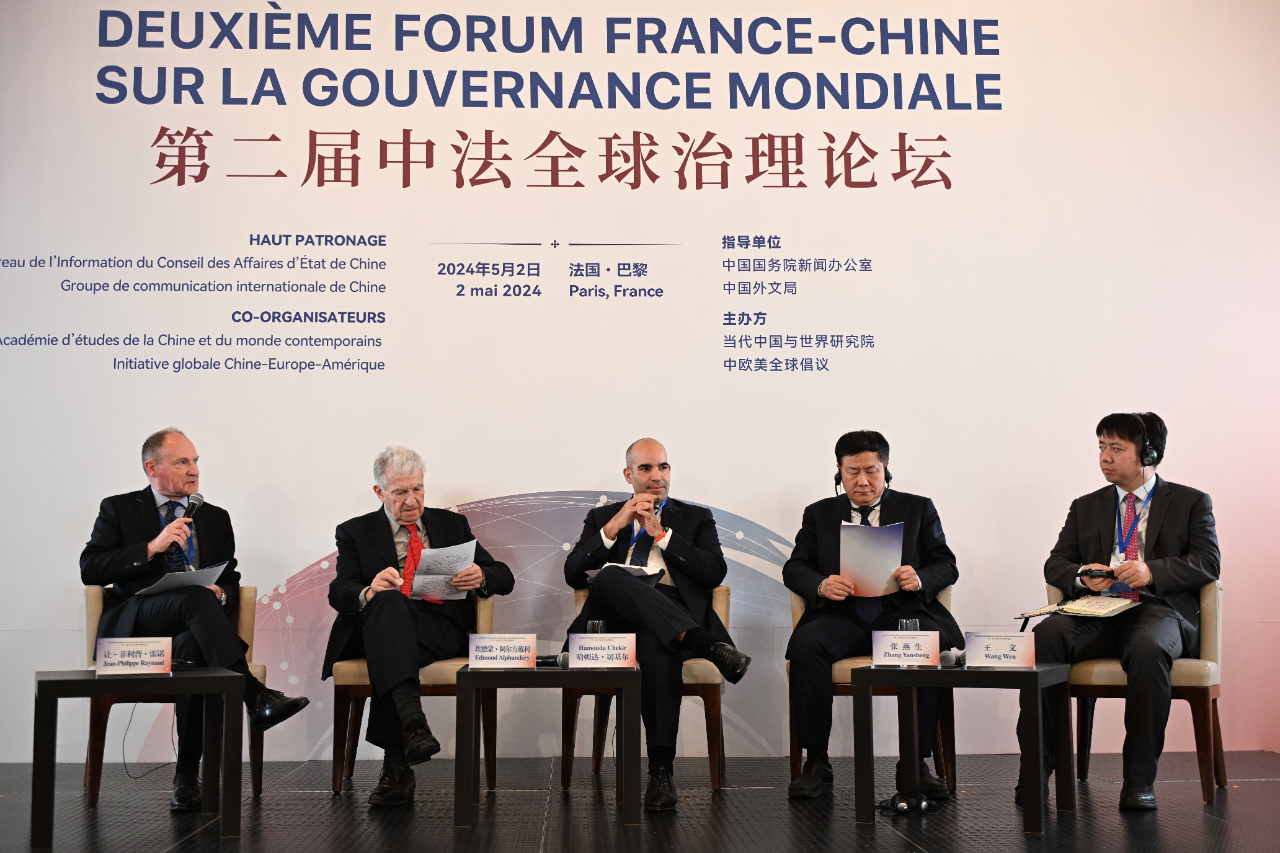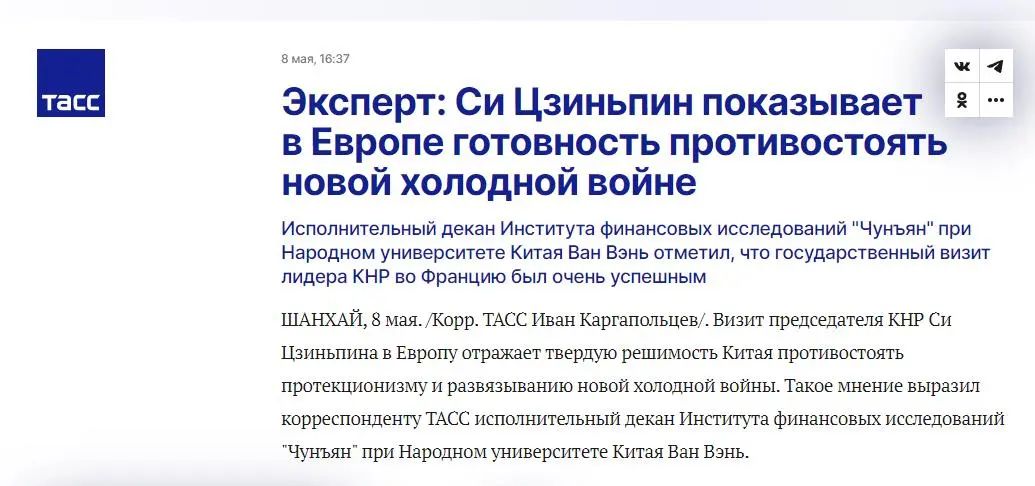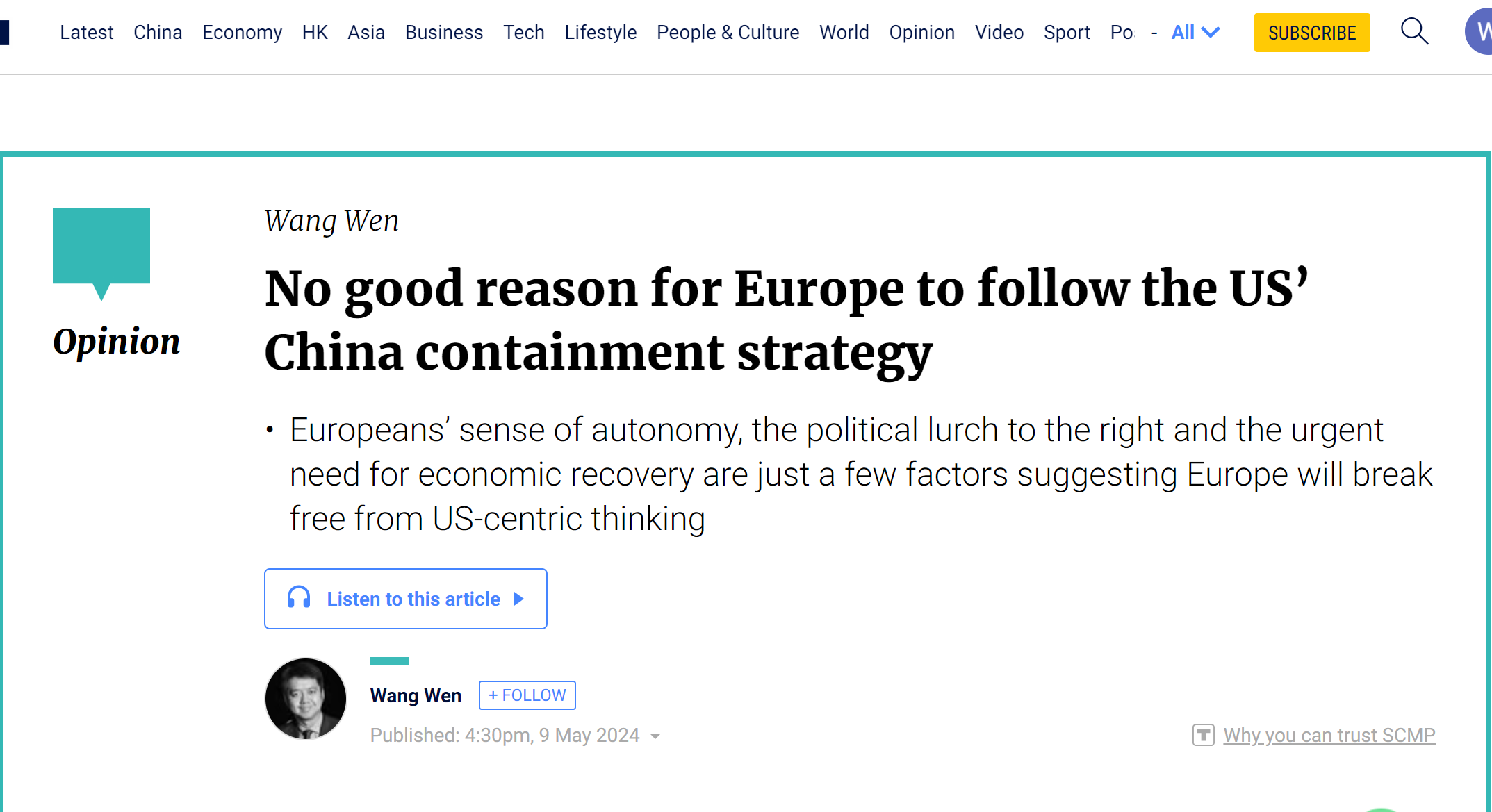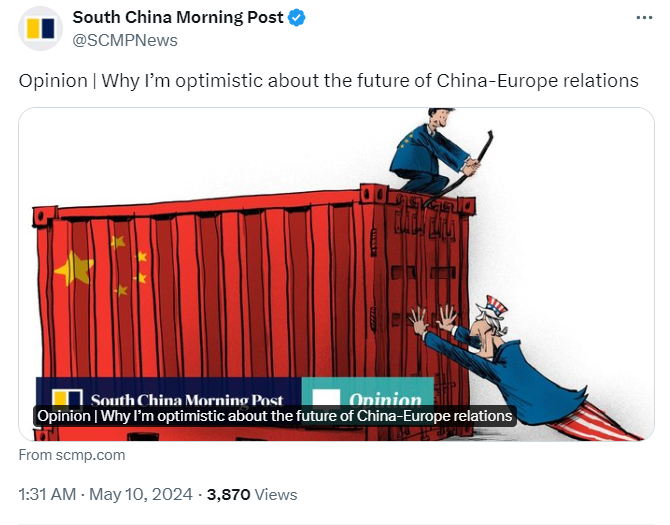发布时间:2024-05-12 作者: 王文
2024年4月29日-5月9日,中国人民大学重阳金融研究院执行院长王文受邀访问法国、德国、比利时,参加10多场智库论坛与相关交流活动。5月7日,王文在观察者网上发表《欧洲在反思:失去俄罗斯之后,不能再失去中国》,阅读量达10万+。
编者按:2024年4月29日-5月9日,中国人民大学重阳金融研究院执行院长王文受邀访问法国、德国、比利时,参加10多场智库论坛与相关交流活动。5月7日,王文在观察者网上发表《欧洲在反思:失去俄罗斯之后,不能再失去中国》,阅读量达10万+。相关观点还在凤凰卫视、俄罗斯塔斯社表达。9日,王文在《南华早报》刊发题为《欧洲没有好理由跟随美国的遏制中国战略》长篇评论,认为美国拉拢欧洲遏制中国的举动,将注定失败。人大重阳君将其翻译如下,并在文后附上英文原文:
▲5月7日,凤凰卫视就中欧合作等话题专访王文
中国国家主席习近平2024年第一次出访目的地是欧洲。此前的半年,我四次去欧洲,调研了包括此前高层访问法国、塞尔维亚、匈牙利在内的9个国家,与100位欧洲朋友聊天,真实感受到欧洲自主意识的崛起,也更确信地看到美国拉拢欧洲遏制中国战略将注定失败。
乌克兰危机两年多后的欧洲,会时常听到不少智库与媒体的反思。有的批评美国对欧洲事务插手以及北约五次东扩酿成的恶果;有的在反思制裁俄罗斯的无效以及俄罗斯终究不可能被打败;更多人在反思,危机导致欧洲能源价格上涨与严重通胀危机,加重了民生负担。欧盟成员2024年经济增长不会超过1.5%的事实,更令越来越多的欧洲人意识到,回归经济增长与民生福祉,才是当下欧洲的当务之急。
经济!经济!经济!欧洲比任何时候都渴盼着经济的复苏,这正是越来越多中国游客重回巴黎、柏林、罗马会令欧洲兴奋的重要原因。

▲5月2日,王文在巴黎参加第二届中法全球治理论坛
5月初,我在法国、德国、比利时参加了12场会谈。感到欣慰的是,我没有听到任何欧洲人讲“与中国脱钩”。“去风险”这个替代词也几乎很少被提及。法国、德国频繁提到的是中国“产能过剩”。中国不喜欢这个词,它与基本事实不符,也不利于中欧未来的合作。
不过,在我看来,“产能过剩”对“脱钩”和“去风险”的替代,暴露了欧洲人内心的焦虑与妥协。中国在新能源汽车、光伏产业的迅猛崛起,让一向以低碳自居的欧洲人自惭形秽。
欧洲不得不承认,在气候变化应对上,中国正成为全球领衔者。中国清洁电力(可再生能源和核电)已超过全球40%,中国新能源车产销量已超过世界的60%,中国产的太阳能电池板超过全球总产量的80%,中国还建成了世界规模最大的绿色融资体系。
尽管中欧贸易与投资面临着意识形态与地缘政治的冲击,但与欧洲朋友的交谈中,我听到更多的不是对中国无底线的批判,而是对中国无上限的需求。
欧洲希望有更多中国游客来到欧洲,希望中国参与乌克兰危机的调停,希望与中国一起推动低碳发展与气候变化的应对,还有包括在非洲的第三方合作、中欧投资协定的尽快落地、新能源车与光伏的合作等等。

▲5月8日,俄罗斯塔斯社就中欧合作等话题专访王文
尽管时常有欧洲政客公开高调地挥舞着自己对中国的拳头,但他们内心很清楚,欧洲离不开与中国经济合作的贡献。
欧洲人越来越清醒,失去了俄罗斯之后,不能再失去中国。
这些反思正在促使欧洲加速“右转”。2024年欧洲议会选举,极右翼民粹主义政党表现越来越突出。在荷兰、瑞典、意大利,一贯被视为极右翼民粹主义代表的人物或政党已上台执政或者参与执政。在法国、德国、芬兰、葡萄牙、丹麦,极右翼民粹主义政党的支持率都在持续走高。
绝大多数中国人都看不懂欧洲左转或右转到底意味着什么,更不愿干预欧洲的政治选举。但欧洲右翼们极力想回归自身发展、推动经济增长的意愿,却是值得肯定的。
更令多数欧洲人感到不安的是,如果2024年特朗普重回白宫,那将是巨大的冲击。但另一方面,那也意味着欧洲将继续走在战略自主的道路上,更宣告着拜登政府试图拉拢欧洲共同遏制中国的失败。
不少中国人已发现,欧洲与美国是不同的国际行为主体。如果说中美之间或许还存在着结构性战略竞争关系的话,那么,中国与欧洲之间根本就不存在实质性的战略矛盾。双方都有悠久的文明传统,都偏好于绿色发展,都努力推动着区域和平,都追求着公正、平等、合理的国际秩序。欧洲没有任何逻辑与中国形成全面战略竞争关系。
在习近平主席到访法国前三天,我在午间沿着艾菲尔铁塔、凯旋门、协和广场、卢浮宫、巴黎圣母院的慢跑,观察到整个巴黎正在渐渐恢复了疫情前“到处都是中国人”的盛况,塞纳河左岸的旧书商贩们友好地向我打着招呼,阳光下一切都是那么美好。
我相信,越来越频繁的人员往来,会让包括法国在内的欧洲人对中国的看法摆脱美式思维,重回务实主义的正轨。这正是我对中欧交往未来感到乐观的原因。
英文原文


▲5月9日,王文在《南华早报》刊发题为《欧洲没有好理由跟随美国的遏制中国战略》长篇评论,5月10日《南华早报》推特转发此文
No good reason for Europe to follow the Us'China containment strategy
Chinese President Xi Jinping’s first state visits this year are all to European countries. Six months ago, I visited Europe four times, conducting research in nine countries includingFrance, Serbia and Hungary, the three states on Xi’s itinerary.
After conversations with more than 100 European friends, I feel that Europeans’ sense of autonomy is growing. This reinforces my belief that the US strategy of courting Europe to contain China is bound to fail.
Two years after the Ukraine crisis began, certain reflections have become more common among European think tanks and media. Some criticise the consequences of US intervention in European affairs and the consequences of Nato’sfive rounds of eastward expansion after the Cold War.
Others ponder the ineffectiveness of sanctions and theimpossibility of defeating Russia. More people are reflecting on a crisis which resulted in higher energy prices, serious inflation and an increased burden on livelihoods.
With economic growth in the euro zone not expected to exceed 1.5 per cent next year, there is an urgency for leaders in Europe to focus on recovery and people’s well-being. Europe needs an economic rebound more than ever and thereturn of Chinese tourists to cities like Paris, Berlin and Rome is fuelling excitement.
So far this month, I have attended 12 events in France, Germany and Belgium. I was relieved not to hear any Europeans talk about decoupling from China;“de-risking” also rarely came up.
Instead, there was frequent mention in France and Germany of China’s alleged“overcapacity”. China does not like this word: it neither matches the facts nor is conducive to cooperation. But in my opinion, “overcapacity” is at least preferable to decoupling or “de-risking”; it exposes Europeans’ anxieties and their desire to compromise.
Theswift growth of China’s electric vehicle (EV) and solar panel production and sales, coupled with the establishment of the world’s largest green finance system, has subjected Europeans’ professed dedication to low-carbon development to a rigorous stress test.
Europe must acknowledge, however grudgingly, China’sleadership in climate change mitigation. China’s capacity for renewable energy exceeds 40 per cent of the global total. China’s EV sales make up 60 per cent of the world’s total and its production of solar panels exceeds 80 per cent of the global output.
Despite the ideological and geopolitical impact of this on Sino-European trade and investment, my conversations with European friends reveal not limitless criticism of China but limitless demands.
Europe yearns for an array of outcomes including increased Chinese tourism, Chinese mediation in the Ukraine crisis, collaboration on low-carbon development and climate change, accelerated implementation of theChina-EU investment agreement and cooperation on EVs and solar power.
China has been among the European Union’s largest trading partners for years, and has been Germany’s most important for eight consecutive years. Last year, France’s direct investment in China increased by 84 per cent.
How do France’s ambitions as a global leader figure in China-US relations?
More than 10 per cent of Germany’s foreign investment went to China last year, the highest proportion since 2014. Europe’s leading economy is clearly voting for China. From 2035, Europe willban the sale of new petrol vehicles, fuelling demand for EVs, which the EV industry based in China can be expected to help meet.
While some European politicians publicly brandish their fists at China, in private they are aware of Europe’s dependence on economic cooperation with China. Europeans are increasingly realising that after losing Russia, they cannot afford to lose China.
Across Europe, populist tub-thumping has fuelled a political shift to the right. Right-wingers are gaining prominence ahead of theEuropean Parliament elections next month, while figures and political parties traditionally associated with the right are growing as a force in the Netherlands, Sweden, Italy and elsewhere. Support for right-wing populist parties is on the rise in France, Germany, Finland, Portugal and Denmark.
Many ordinary Chinese may not understand the implications of European politics or even have a desire to do so. But the willingness of European right-wingers to focus on domestic development and economic growth is seen as commendable.
For many ordinary Europeans, the prospect of DonaldTrump’s comeback as US president is alarming. But as a result, they recognise that they must continue down the road of strategic autonomy. This also reflects the Biden administration’s failure to court Europe and so contain China.
Many Chinese have started to realise that Europe and the United States are different international actors. While there may be structural and strategic competition between China and the US, there is no substantial strategic contradiction between China and Europe.
Both China and Europe are long-standing civilisations, prefer green development, strive for regional peace and pursue a fair, equitable and rational international order. There is simply no logical basis for Europe to seek comprehensive and strategic competition with China.
Five days before President Xi’s visit to France, I jogged past the Eiffel Tower, Arc de Triomphe, Place de la Concorde, Louvre museum and Notre Dame cathedral. In this city of light, there is no shadow of the anti-Chinese feeling that emerged from the brief hysteria of the Covid-19 pandemic. Warm greetings from old book vendors along the left bank of the Seine added to the beauty of Paris in the bright sunshine.
I believe that increased exchanges will lead Europeans, including the French, to break free from US-centric thinking and to return to pragmatism. That’s why I feel optimistic about the future of China-Europe relations.
(欢迎关注人大重阳新浪微博:@人大重阳 ;微信公众号:rdcy2013)